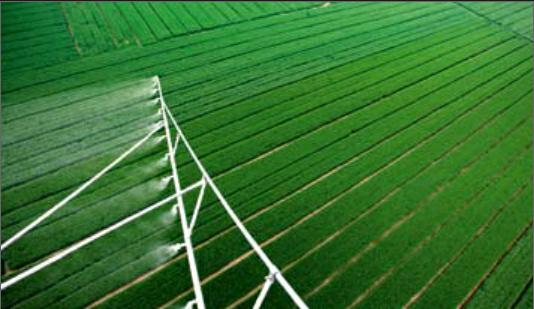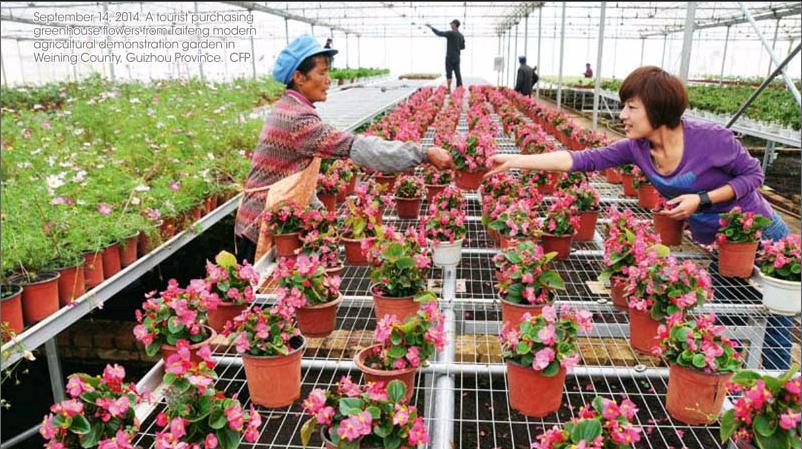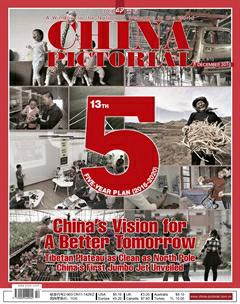Professional Farmers In Modern Agriculture
by+Lily


Chinese agriculture, which is closely linked to adequate food and clothing for more than a billion people and the livelihoods of hundreds of millions of farmers, will, doubtless, be Chinas top priority in the next five years. In the 13th Five-Year Plan, the direction of rural area development is to promote agricultural modernization, create a new breed of professional farmers, improve productivity, guarantee food security, promote agricultural development and maintain stability in rural areas.
Internet + Agriculture
At the 852 Farm in Heilongjiang reclamation area, a Claas lexion-770 combine harvester is being guided across the corn field by satellite navigation. The machine spits out pulverized corn stalks, but stores corn kernels in its cabin. This is an integration of the worlds most advanced science and technology of harvesting machinery. It has an operating area of 6.6 acres per hour. One can read the real-time scheduling on a large computer screen at the control center about several kilometers away, with real-time information such as water content, yield, and harvested acreage of crop.
With large agricultural machinery, satellite remote sensing technology, and ‘Internet of Things technology, traditional farming – described as “facing the earth with back to the sky” – is being gradually ousted by modern modes where agricultural machines have taken the place of humans to be found only on farms. Whats more, valuable insights and inputs can be had from the Internet for agricultural production, services, product circulation, sales, food quality supervision, etc. Liu Shunde, Director of Fugou County Chives Institute, who has sold vegetable seeds for more than 20 years, is now busier than ever before. This year, he has been selling vegetable seeds via online channels such as QQ and WeChat stores. More than one-third of his total sales are through these channels, which have expanded product delivery from counties and cities to hitherto less accessible places across the country.“E-commerce can be more efficient. Now, with the Internets popularity, as long as you have a good product, you dont need to worry about sales. I have the confidence that I can make Fugou chives seeds the top brand.”
Internet technology, as the glue that holds together all facets of agricultural modernization, will greatly accelerate the process. Countries with developed agriculture usually achieve mechanization and modernization before application of technology-based information, while China will probably promote and integrate mechanization, modernization and information technology in agriculture at the same time.
Li Daoliang, professor at Information and Electrical Engineering School of China Agricultural University, said, “The 13th Five-Year Plan proposes to promote IT in agriculture. Driven by the Internet, big data, and cloud computing, the agricultural modernization process, which took developed countries a hundred years to accomplish, will probably be completed by China in the next 20 years. This is a change of the worlds agricultural development law.”
Although “Internet+agriculture” has obvious effects in transforming the traditional circulation of agricultural products, its development is constrained by problems such as lagging-behind Internet infrastructure and logistics system in rural areas, especially cold-chain logistics system, farmers lack of skill training, etc. However, under the 13th Five-Year Plan, efforts would be increased for supporting this aspect at the appropriate level of taxation, finance, and technology, so that the Internet acts as catalyst to boost agriculture.
New-Type Professional Farmers
At the Xinweilong Vineyard, which is located in Xietian Village, Meixian District of Meizhou City, Guangdong Province, strings of crystal clear grapes are hanging on the vines. This is a company co-established by several people born in the 1980s. Since its establishment in 2011, the grape production base here has expanded from less than 10 to 30-plus acres. When grapes ripen every year, people flock here for a tour and picking grapes.
Wu Xinran, who is in charge of this company, said, “Now, Meizhou Grape Base produces 1,000 kilograms of grapes per mu(1 mu=0.067 hectare), so basically all can be sold domestically. This year, we are preparing to build a new production base at Huangpu District of Guangzhou City.” Compared with traditional farmers, Wu Xinran, as a ‘professional farmer, is occupied more with agricultural operations. Xinweilong Company mainly applies the mode of ‘company+base+farmers. Wu Xinran uses enterprise management methods with the farmers so that the skilled ones can“earn more by working more.”
In recent years, low efficiency of traditional agriculture has led to large-scale migration of rural labor, land being left uncultivated, and outflow of agricultural talent. The emergence of the new-type farmers signifies that “farmer” is now officially a decent career choice. According to Liu Yutao, a Ph.D. candidate at South China Agricultural University, the new professional farmers are scientific practitioners with modern production skills as well as management and operation capabilities. They are engaged mainly in agriculture for their principal income, and they live in villages or towns.
The essence of modern agriculture lies in science and technology, while the key is talent. The 13th Five-Year Plan emphasizes the cultivation of new-type farmers. However, as this is at the first stage of the shifting from individual farming to large-scale farming, market rules have not been established and the risks are made worse by the uncertainties. In order to establish a sound support system for new-type professional farmers, the 13th Five-Year Plan proposes to stabilize the land contract relationship in rural areas, improve distribution regulations of ownership, codify contracting and management rights, promote orderly transfer of management rights, and establish a policy system for new-type agricultural entities.

